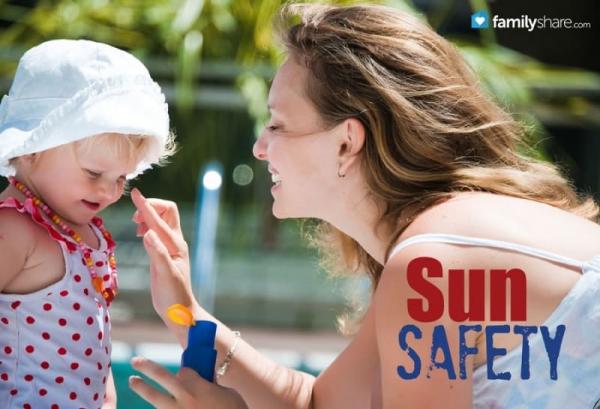
Summertime means more time outside enjoying longer days and endless rays. There are many benefits to enjoying the sun, including improving mood and absorbing Vitamin D. However, too much sun can be damaging to skin and promote aging, wrinkles and skin cancer. Read these six guidelines to keep your family safe in the sun not only in summer, but year round.
Sunscreen
When used properly, sunscreen can protect your skin from damaging UV rays. The Food and Drug Administration (FDA) recently released new guidelines for sunscreen use. Labels have been changed, so look for a sunscreen that reads "broad spectrum protection,"� which means it repels both UVA and UVB rays. Most people don't put on enough sunscreen (a golf ball-sized amount), and they don't reapply as often as they should (every two hours).
New labels also indicate that no sunscreen is truly waterproof, but rather water resistant. Sunscreen should be reapplied after swimming or vigorous exercise. SPF (sun protection factor) is important. Sunscreens with a lower SPF than 15 don't protect well, and those with an SPF over 50 aren't any better than those under. I've found that creams and sticks work better than the spray-on sunscreens, which tend to blow away in the wind and cover unevenly. But, spray products are great for reapplying or to give an extra coat of coverage.
Cover up
An easy way to protect your family further from the sun is to cover your skin. Wear sunglasses and a wide-brimmed hat. Choose a lightweight long-sleeved shirt. All clothing provides sun protection. If you want more coverage, some companies make swimming cover-ups and clothing with built-in UPF protection. REI and Lands' End both offer this type of clothing. This clothing will help fair-skinned people and children more than darker-skinned people.
Time
UV rays are strongest in the summer months and during the middle of the day. Avoiding the sun between the hours of 10 a.m. and 2 p.m. will keep you protected from the most damaging rays. If you do need to be out during this block of time, be diligent about applying and reapplying sunscreen.
If you spend too much time in the sun without proper rest, protection and hydration, you put yourself at a greater risk for heatstroke. The Mayo Clinic notes that young children and older people are at a greater risk for heatstroke. When outdoors, particularly on hot days or in the middle of the day, encourage your family to drink lots of water and rest often.
Altitude
My family recently traveled to Colorado. The hotel we stayed at was at an elevation of 8,000 feet. We noticed the sun affected us much more quickly. When at high altitudes, protect your eyes with sunglasses and your skin with clothing or sunscreen. Remember sun protection when enjoying winter sports as well.
Young children
Babies under 6 months of age should not use sunscreen. Protect them with clothing, hats and shade. Babies older than 6 months can use sunscreen, but should also wear hats and avoid prolonged time in direct sunlight. Children often have sensitive skin, so choose your sunscreen wisely. I have two fair-skinned children and two olive-skinned children. Even though my olive-skinned daughters don't burn as easily, I protect them with sunscreen just as I do my fair-skinned children.
Protect everyone
My friend recently adopted two children from Ethiopia. They have darker skin then her Caucasian children, and she was wondering if they needed sunscreen to protect their skin. Although dark-skinned people have more melanin, which means more natural sun protection, they should wear sunscreen as well to protect from cancer, aging and wrinkles. It will take longer for dark-skinned people to burn and be affected by the sun's rays, but no one is immune from sun damage.
Nothing lifts my mood after a rainy Oregon winter like the first sunny days of spring. The sun is crucial to life on earth, as is protecting your family from too much sun. As you enjoy outdoor activities, make sure you pack along your sunscreen, hat, sunglasses and water. You'll live longer and look better if you do.

